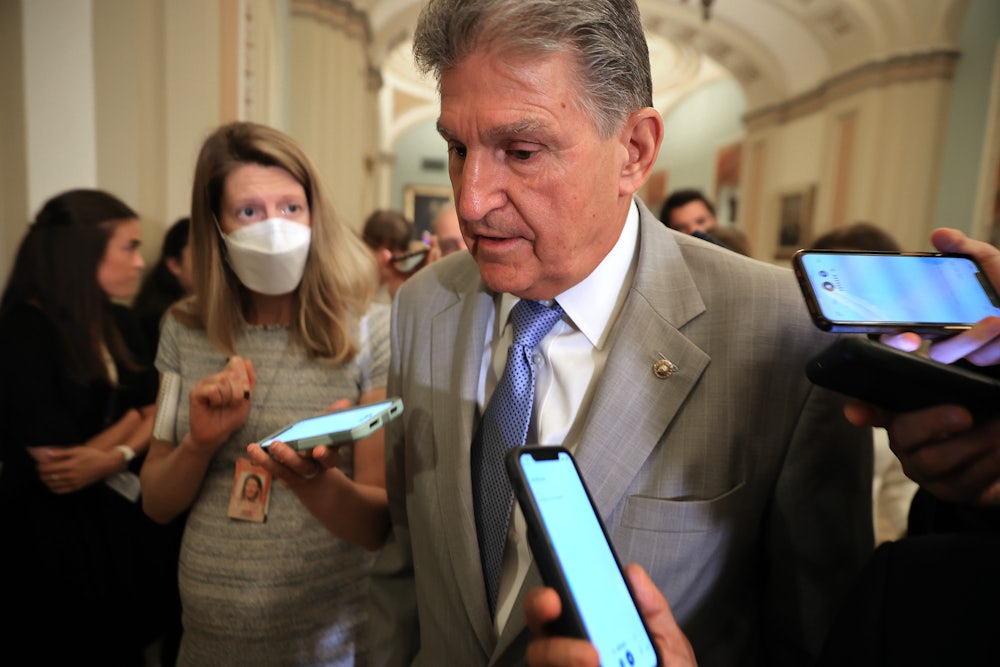For those who say the budget framework I proposed costs “too much,” what would you cut? Combating climate change? Childcare? Universal pre-K? Paid family & medical leave? Dental, hearing, and vision? Housing? Long-term home health care? Child tax credit?”
—Senate Budget Committee Chairman Bernie Sanders, June 28
Is it childcare you want to take off the table? Is it home community-based care? How about universal preschool? You just want to say, you know, to 3-year-olds and 4-year-olds, “We’d rather the billionaires keep the money rather than you actually get a good start on your education”? Or is it Medicare? Vision, dental, hearing? Or the climate crisis? Really? We’re gonna leave that money with giant corporations and tax cheats instead of putting it into fighting the climate crisis?
—Senator Elizabeth Warren, September 15
When people say, “Oh, it’s too big” … what would you cut? Would you cut care for people with disabilities or seniors who need help or children who are sick on a prolonged basis? What would you cut? Would you cut family and medical leave—paid-for family and medical leave? Would you cut childcare where you can’t—cut universal pre-K? What would you cut? Would you cut the childcare tax credit?
—House Speaker Nancy Pelosi, September 23
For months congressional Democrats have tried to get Senators Joe Manchin and Kyrsten Sinema to state what it is they want to cut from the budget reconciliation bill. These recalcitrant legislators refuse to take the bait. Allow me to take it for them.
It’s absurd to pretend that a bill that expands government spending by $3.5 trillion over 10 years can’t be trimmed. It’s absurd even to call such trims “cuts.” Nobody—or rather, nobody except congressional Republicans, who’ve removed themselves from this conversation—proposes to cut existing spending on childcare or health care or the environment. Nobody proposes even to cut routine annual growth in such spending. The argument is about not how to shrink the pie but rather how much bigger to make it.
All parties agree that the pie should be enlarged by quite a lot—even before you factor in the $1 trillion infrastructure bill that Manchin and Sinema both voted for, along with every other Senate Democrat plus 19 Republicans (not to mention the $1.9 trillion in Covid relief that every Democrat voted for in March). It’s a matter of legitimate frustration that Manchin and Sinema, in addition to not saying what parts of the reconciliation bill they’d discard, won’t say publicly how much more spending they’re willing to tolerate. But Manchin did blurt out on CNN earlier this month, “It’s going to be $1, $1.5 trillion,” and Axios reported a few days before that that $1.5 trillion was Manchin’s top bid. House Whip Jim Clyburn pointed out on CNN that that makes it a negotiation over $2 trillion. Split the difference and you cut the reconciliation bill by $1 trillion.
We can do that.
Nobody is willing to say so—not Manchin or Sinema on one side, not Sanders or Warren or Representative Pramila Jayapal, leader of the Congressional Progressive Caucus, on the other—because nobody wants to compromise his or her negotiating position. Not publicly, anyway. (Whatever these negotiating parties, who now include President Joe Biden, are saying in private has thus far remained largely private.)
Not being party to any negotiations myself, I’m willing to identify $1 trillion that can come out of the bill. Hell, it’s only $100 billion per year. Having spent much of my journalism career editing other people’s copy, I bring to this task the knowledge that there is no document in the world that can’t be made shorter. So here goes.
Cut dental coverage from Medicare expansion. The reconciliation bill would create new Medicare coverage for dental, vision, and hearing. That costs $358 billion over 10 years, according to a 2019 analysis by the Congressional Budget Office. Most of that is for dental coverage.
I’m not saying dental care isn’t important, especially for older people. According to the Centers for Disease Control and Prevention, two-thirds of all people over age 65 have gum disease. It’s especially prevalent among people with arthritis, diabetes, and heart disease. On the other hand, fully 20 percent of all people over age 65 have lost all their teeth, obviating the need to treat any. (Granted, extending Medicare coverage would help keep these teeth from being lost in the first place.)
Coverage for hearing and vision are less expensive and, I’d argue, more urgent. One-third of all people age 65 to 74, and almost half of all people 75 and older, have some hearing loss, according to the National Institutes of Health. There isn’t a thing Medicare will do about that. No, that’s not quite right. Medicare will pay for you to visit an audiologist so you can find out you need a hearing aid. But it won’t help pay for that hearing aid. (Full disclosure: I am 63 and already I have sufficient hearing loss that I wear Bose Hearphones, a cheap alternative to hearing aids that Bose has taken off the market because it now wants you to buy something twice as expensive.)
Medicare will cover visits to the eye doctor for problems like glaucoma and cataracts, but it won’t cover eye exams to get fitted for eyeglasses or contact lenses. This is a basic need; something like half of all people, regardless of age, wear corrective lenses of some kind, and you’ll be hard-pressed to find anyone over 65 who doesn’t wear glasses. An elderly person with untreated compromised vision or hearing will not only be miserable; he or she also will be more isolated, accelerating that person’s cognitive decline. Half-blind and half-deaf people also pose a greater risk to others when behind the wheel. Gum disease is bad, but if you don’t want to get run over when crossing the street, let’s cover vision and hearing first.
Saving: $238 billion. We’re a quarter of the way there.
Cut the Civilian Climate Corps. Biden wants to create a program modeled on the New Deal’s Civilian Conservation Corps that would employ young people—tens of thousands of them—to restore wetlands, install solar panels, and so on. It’s a lovely idea, but the actual benefit to climate change is very difficult to predict, and if the program’s anything like the much smaller Job Corps, abuses will get uncovered on a regular basis. Get rid of it.
Saving: $15 billion.
Don’t lower Medicare eligibility age to 60. It’s a great idea. It should happen someday. But it’s really expensive. Let’s keep people aged 60 to 65 (including me) in the private health insurance market for now.
Saving: $350 billion.
Eliminate deductibility of state and local taxes. One of the few things President Donald Trump got right on taxes was that he capped the deductibility of state and local taxes, or SALT, at $10,000, thereby increasing federal revenues by $85 billion per year. Why should someone in Mississippi pay higher federal taxes so that somebody in New York or California (which spend more on state and local government) can pay lower federal taxes? Particularly since that person in New York or California is probably wealthier. According to the Committee for a Responsible Federal Budget, more than half the benefit of removing the SALT cap would go to the richest 1 percent.
Rather than add $850 billion to the reconciliation bill’s $3.5 trillion price tag, let’s consider following Trump’s lead and eliminate SALT deductibility altogether.
Saving: $150 billion.
Lower caps on eligibility for paid leave, child tax credit, and childcare subsidies. These are all extremely generous. For example, the paid leave benefit extends to families with incomes all the way up to $250,000. I’m not proposing we impose a means test on any part of the reconciliation bill (say, universal pre-K) that doesn’t have one. I’m proposing that where the reconciliation bill applies means tests, we make those means tests a little bit stingier. Hard numbers on potential savings are difficult to find, but handing out these subsidies to fewer families with six-figure incomes should be sufficient to take us across the finish line.
Saving: $250 billion.
The Congressional Budget Office hasn’t yet scored the reconciliation bill, so some of these numbers may be a little off. But on the plus side, I found these cuts on my own, working a single day with a doctor’s appointment in the middle of it. If my editor didn’t need to take his daughter to soccer practice, I could probably find more.
Take these $1 trillion in trims to Manchin and Sinema. Tell them to take it or leave it. If they say “leave it,” tell them they won’t get the infrastructure bill they both very much want. Even if the House passes it before reconciliation, Biden can tell them he’ll veto it if he doesn’t get the reconciliation bill too.
I have written before that this impasse will find a solution and the reconciliation bill will clear the House and Senate. Probably this solution isn’t the one. Nancy Pelosi is much better at this sort of thing than I am. But I hope at least I’ve persuaded you that slimming down the reconciliation bill is quite achievable.
I’m not saying it’s a pleasant task. Except for the Civilian Climate Corps and the SALT deduction, I don’t relish wielding this scalpel. But a $2.5 billion reconciliation bill would still be a triumph for the Biden administration. It would bestow free community college; free preschool; more generous Pell grants; a Medicaid bailout for red states that their legislatures don’t deserve (but their poor folks do); significant financial incentives to eliminate power plants’ reliance on coal; more rigorous worker protections from labor-law violations; and many, many other blessings. If Paris was worth a mass to Henry IV, then surely reconciliation is worth a few bleeding gums to Joe Biden.






